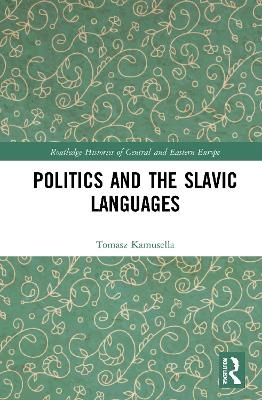
Politics and the Slavic Languages
Seiten
2021
Routledge (Verlag)
978-0-367-56984-6 (ISBN)
Routledge (Verlag)
978-0-367-56984-6 (ISBN)
Through the story of Slavic languages, this timely book illustrates that decisions on what counts as a language are neither permanent nor stable, arguing that the politics of language equates politics in central Europe. The monograph will prove to be an essential resource for scholars of linguistics and politics in Central Europe.
During the last two centuries, ethnolinguistic nationalism has been the norm of nation building and state building in Central Europe. The number of recognized Slavic languages (in line with the normative political formula of language = nation = state) gradually tallied with the number of the Slavic nation-states, especially after the breakups of Czechoslovakia, the Soviet Union and Yugoslavia. But in the current age of borderless cyberspace, regional and minority Slavic languages are freely standardized and used, even when state authorities disapprove. As a result, since the turn of the 19th century, the number of Slavic languages has varied widely, from a single Slavic language to as many as 40.
Through the story of Slavic languages, this timely book illustrates that decisions on what counts as a language are neither permanent nor stable, arguing that the politics of language is the politics in Central Europe. The monograph will prove to be an essential resource for scholars of linguistics and politics in Central Europe.
During the last two centuries, ethnolinguistic nationalism has been the norm of nation building and state building in Central Europe. The number of recognized Slavic languages (in line with the normative political formula of language = nation = state) gradually tallied with the number of the Slavic nation-states, especially after the breakups of Czechoslovakia, the Soviet Union and Yugoslavia. But in the current age of borderless cyberspace, regional and minority Slavic languages are freely standardized and used, even when state authorities disapprove. As a result, since the turn of the 19th century, the number of Slavic languages has varied widely, from a single Slavic language to as many as 40.
Through the story of Slavic languages, this timely book illustrates that decisions on what counts as a language are neither permanent nor stable, arguing that the politics of language is the politics in Central Europe. The monograph will prove to be an essential resource for scholars of linguistics and politics in Central Europe.
Tomasz Kamusella is reader in modern history at the University of St. Andrews, United Kingdom.
1. A Brief Un-Natural History of Languages in Europe 2. Non-State (Minority or Regional) Slavic Languages 3. The Internet: A New Frontier 4. The Politics of Script 5. Pluricentric or Monocentric? 6. Russian as a Pluricentric Language? 7. Conclusion: The Dilemma of Numbers 8. Addendum: The Declaration on the Common Language 9. Postscript on Methodology: People See What They Want
| Erscheinungsdatum | 21.06.2021 |
|---|---|
| Reihe/Serie | Routledge Histories of Central and Eastern Europe |
| Zusatzinfo | 66 Tables, black and white; 2 Line drawings, black and white; 3 Halftones, black and white; 5 Illustrations, black and white |
| Verlagsort | London |
| Sprache | englisch |
| Maße | 156 x 234 mm |
| Gewicht | 630 g |
| Themenwelt | Geschichte ► Allgemeine Geschichte ► Neuzeit (bis 1918) |
| Geschichte ► Allgemeine Geschichte ► Zeitgeschichte | |
| Geisteswissenschaften ► Geschichte ► Regional- / Ländergeschichte | |
| Geisteswissenschaften ► Philosophie | |
| Sozialwissenschaften ► Politik / Verwaltung ► Politische Systeme | |
| Sozialwissenschaften ► Politik / Verwaltung ► Politische Theorie | |
| ISBN-10 | 0-367-56984-1 / 0367569841 |
| ISBN-13 | 978-0-367-56984-6 / 9780367569846 |
| Zustand | Neuware |
| Informationen gemäß Produktsicherheitsverordnung (GPSR) | |
| Haben Sie eine Frage zum Produkt? |
Mehr entdecken
aus dem Bereich
aus dem Bereich
Giordano Bruno - ein ketzerisches Leben
Buch | Hardcover (2024)
C.H.Beck (Verlag)
29,90 €


